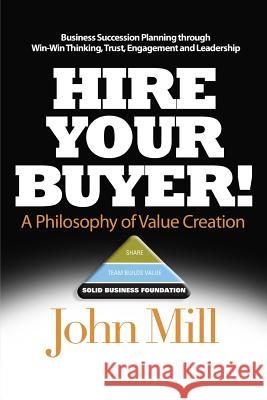Hire Your Buyer: a Philosophy of Value Creation » książka
Hire Your Buyer: a Philosophy of Value Creation
ISBN-13: 9780993843105 / Angielski / Miękka / 2014 / 206 str.
From the Introduction: What Is Hiring Your Buyer? This book offers a solution to a substantial crisis facing business owners between the ages of 50 and 70. In the United States there are six million of these owners and in Canada there are 550,000. It is estimated that 55% of these businesses will transfer or disappear as a result of a calamity. The ensuing fiscal carnage will be a threat to the entire economy. Many small business owners operate in a blissful state, assuming they can always sell their businesses. But the average price of a business listed on the largest business sale website in the US is $155,000, and that's not going to cut it. It comes as quite a surprise to many owners that the same business that pays them $200,000 a year may have zero transfer value. Further, some estimates say that only 30% of businesses go to family members. That leaves millions of businesses in the danger zone. Aside from selling, business owners have only a few options. The most readily available option for those with a solid business foundation and the right team-building skills is to hire your buyer. That is, work with the people in your business; form a team; strategize; clarify your purpose, vision and values; and build more value in your business. Train your successor or team of successors and then watch your business flourish and share in the value created as you transfer it to the new ownership team. That's hiring your buyer. The actual buyer, or team of buyers, may be existing employees, one or more of your children, or you may have to go out and find them. If you are an owner you need to decide whether this option is for you and if it is, you need to take the active steps to make it happen. This book shows you how. The Second E-Myth Over 25 years ago, Michael E. Gerber wrote a bestselling business book called The E-Myth: Why Most Businesses Don't Work and What to Do About It. The e-myth (that is, the entrepreneur myth) is the mistaken belief that most businesses are started by people with tangible business skills, when in fact most are started by "technicians" who know nothing about running a business. Hence, most fail. By contrast, consider that almost every business owner between 50 and 70 is one of the 20% who survived the cut. And most are successful entrepreneurs supporting a decent lifestyle. There are millions of owners who have spent decades building a solid business foundation. This is significant; it means something. Creating a solid business foundation is the most difficult stage of a business. The site has been excavated, the forms put in, the concrete poured and set. But then what happens? For most of these owners, the answer is nothing - they stop building the business at the foundation stage. Why? Because the business satisfies their lifestyle needs. But there is a second e-myth, one that Gerber did not talk about. Most entrepreneurs believe this second myth: they believe they are creating value in their business. This is a myth. A business is something separate from the owner; a business is something that has value and can be sold. What most entrepreneurs have created is a lucrative, interesting job for themselves, but not a business with significant value that they can sell. These entrepreneurs are lifestyle business owners. Their businesses are designed to be the foundation of a decent lifestyle, to generate a good salary and to serve as a vehicle for freedom and expression. The problem is that there is no way that selling that business will support a decent lifestyle in retirement. These businesses are not professionally managed - the entrepreneur covers almost all management functions and makes all the decisions. And these decisions are made for the convenience and comfort of the owner, not for the purpose of maximizing the value of the business. This book sets out a well defined path for creating a team and building value on top of your solid business foundation so that everyone can wi











